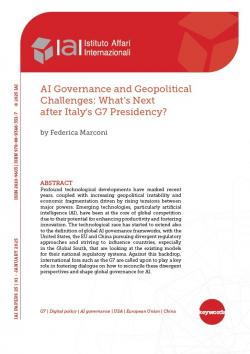AI Governance and Geopolitical Challenges: What’s Next after Italy’s G7 Presidency?
Profound technological developments have marked recent years, coupled with increasing geopolitical instability and economic fragmentation driven by rising tensions between major powers. Emerging technologies, particularly artificial intelligence (AI), have been at the core of global competition due to their potential for enhancing productivity and fostering innovation. The technological race has started to extend also to the definition of global AI governance frameworks, with the United States, the EU and China pursuing divergent regulatory approaches and striving to influence countries, especially in the Global South, that are looking at the existing models for their national regulatory systems. Against this backdrop, international fora such as the G7 are called upon to play a key role in fostering dialogue on how to reconcile these divergent perspectives and shape global governance for AI.
Paper prepared in the framework of the IAI project “AI Governance and Geopolitical Challenges under Italy’s G7 Presidency”.
-
Details
Rome, IAI, January 2025, 16 p. -
In:
-
Issue
25|01 -
ISBN/ISSN/DOI:
978-88-9368-351-7
Introduction
1. The economic impact of AI on the global market
2. The race for AI regulation
3. The geopolitical implications of alternative approaches to AI regulation
4. The role of international fora: Outcomes of the Italian G7
5. Conclusions: A global governance of AI
References
Topic
Tag
Related content
-
Ricerca14/12/2024
AI Governance and Geopolitical Challenges under Italy’s G7 Presidency
leggi tutto



